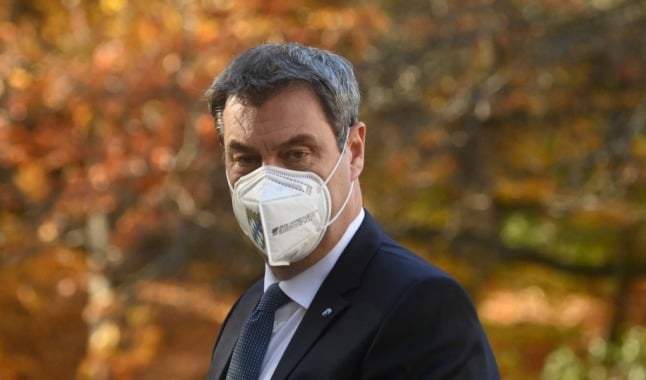“We need to be able to limit contacts for unvaccinated people,” he told a cabinet budget meeting in Munich on Sunday, German media reported.
He said this should be an additional tool to implement if the country wants to avoid being overwhelmed by the virus.
But it shouldn’t be a lockdown for the unvaccinated like in Austria, but 2G – i.e. proof of Covid-19 vaccination or recovery “with the same results”.
READ ALSO: Austria confirms lockdown for the unvaccinated to begin on Monday
He said the situation was at risk of “slipping out of our grasp” across the whole country with the danger of hospitals collapsing and healthcare professionals having to decide which patients to care for.

This chart from Our World in Data shows the rising case-rate trend across Germany and most countries covered by The Local.
There are currently 3,000 patients with Covid-19 in intensive care, still a way off the peak of 5,762 seen at the start of January.
“Shirking the situation doesn’t help,” the CSU minister said, calling for the federal and state governments to act together in solidarity.
He also called on the future coalition negotiating partners (SPD, Greens and FDP) to take doctors’ concerns seriously and significantly toughen up the draft infection protection law, which he said was “insufficient in every respect”.
“With the laws that are currently planned, Germany is in no way winter-proof. We are stumbling into an ice-cold winter with shorts and summer tyres, so to speak. It will not work,” he warned.
The Bavarian state government want 2G or even 2G+ (vaccination, recovery or negative rapid test) rules to apply across the whole country uniformly.
They also want to see FFP2 masks being made compulsory on trains Germany-wide as well as a cap on numbers at events, echoing statements made by German Green party head Robert Habeck and SPD health expert Karl Lauterbach.
In Bavaria itself, restrictions are set to tighten from Tuesday, with the introduction of 2G rules for guests in restaurants, hotels and at events, while masks would still have to be worn, too.
His statements came as Germany’s public health body, the Robert Koch Institute (RKI), reported a record seven-day incidence rate for the seventh consecutive time.
On Sunday, the value stood at 289 per 100,000 people, the highest level seen during the pandemic so far.
READ ALSO: Could Germany really see a lockdown this winter?
READ ALSO: Why Germany’s Covid booster jab campaign has failed to take off
READ ALSO: Skip big parties, urges German health agency amid Covid surge



 Please whitelist us to continue reading.
Please whitelist us to continue reading.
Member comments